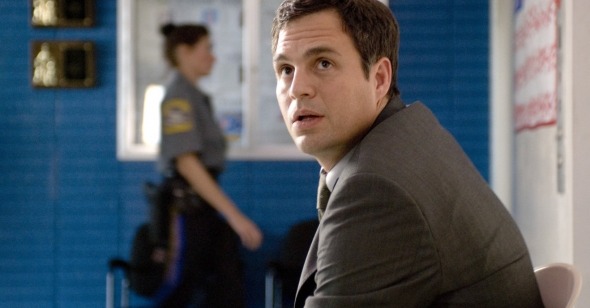Vengeance Is Ours
by Kristi Mitsuda
Reservation Road
Dir. Terry George, U.S., Focus Features
Revenge seems to be floating in the collective consciousness, at least as evidenced by current cinema trends. On the heels of Neil Jordan’s ideologically troublesome vigilante treatise The Brave One comes Terry George’s tale of star-crossed fathers and families in Reservation Road, which introduces in broad strokes a classical vision of the American dream so as to put into starker relief the tragedy when it befalls. Set in an insular Connecticut community, the ridiculously good-looking and as-happy-as-humanly-possible Learners—comprised of Ethan (Joaquin Phoenix), Grace (Jennifer Connelly), and their two children, Josh (Sean Curley) and Emma (Elle Fanning)—are established as the apple-pie ideal; the opening has the family basking giddily in their perfect glory at a waterfront recital where Josh plays the cello with the school orchestra. Meanwhile, a cross-cut to Dwight Arno (Mark Ruffalo) and his son, Lucas (Eddie Alderson), interrupted at a Red Sox game by an irate cell call from ex-wife Ruth (Mira Sorvino), unveils Dwight, naturally, as the fuck-up father. In an alternate cinematic universe, Reservation Road’s physical and emotional clash might’ve given rise to an interesting examination of class—Dwight initially seems a salt-of-the-earth counterpoint to Ethan; but the former’s profession, soon revealed as a pivotal plot point, is as white-collar as they come, and relegates the film to the conventional realm of the Hollywood revenge drama.
The separate storylines are brought together when Dwight races his car down Reservation Road; anxious to get Luke back to his mother’s before she finds yet more cause to yell, he contributes to an accident that leaves Josh dead by the roadside where his parents have stopped for gas. After a brief hesitation, Dwight flees, and we understand this post-hit run as an act borne out of his deep-seated insecurity and fear of having mucked things up again—an untenable prospect given the already fragile custody arrangement with his ex. Reservation Road, based on John Burnham Schwartz’s novel of the same name, and adapted by him for the screen together with George, aspires toward a compassionate dissection of a deadly collision’s aftermath from the perspectives of both victim and perpetrator (an ever-sympathetic Ruffalo, whose warm, teddy-bear appeal here reaches its limit)—a conceit not without possibilities and yet, in the director’s hands, neither enlightening nor exciting as it believes itself to be.
Although the film at first moves in such a way that you expect it to go the pensive, humanistic route—tracking the emotional frequencies as each father struggles to regroup—its slow-burning melodrama segues into suspense flick clichés as Ethan takes on a more proactive role in finding the culprit. Grace, exasperated when she notices him stoking his anger via chat-room conversations with other grief-stricken parents, encourages Ethan to hire a lawyer to keep tabs on the ongoing police investigation. The pieces fall into place as he unknowingly enlists the perp in his own capture—yes, that’s right; it so happens that Dwight practices law in town—and the built-in suspense of the schematic scenario slackens with each passing moment. Reservation Road is too lethargic and inept to capitalize on its thriller tendencies or substantially invest in the emotional shadings that might help fill in the spaces between. Character interactions boil down to a series of clichéd crescendos (as in Dwight’s preemptive video-confessional to Luke, or Ethan’s tirade upon returning home to find Grace disposing of Josh’s things). And each turn is telegraphed long before it happens—a single scene encapsulates the leery queasiness of the cat-mouse dynamics: Being introduced to his new client, the camera takes on Dwight’s point-of-view; handheld first-person shots are hardly original, but here we confront Ethan literally head-on, and flinch along with Dwight away from his probing gaze, wondering if there might be a spark of recognition in it.
As usual, Connelly weeps gorgeously in the background, and Phoenix chews the scenery with brilliant gusto—his serious, professorial beardedness grows more unhinged and swarthily creepy the more consumed he becomes with the idea of avenging his son’s death. “Justice,” he IMs to a bereft mother: “I have to take care of that myself.” In the production notes, George says, “I pursued Reservation Road in part because it investigates the motives of revenge and hatred and fear, and where those lead people. In this post-9/11 world, ‘an eye for an eye’ needs to be examined through drama. What happens when that thing we see on television—‘revenge’—comes home to you on a very personal level? I saw this story as realistic and important.” Surely the filmmaker who made Hotel Rwanda, even as the history-repeating-itself atrocities taking place in Darfur raged on, is sincere (if a tad pretentious and lacking in sophistication) in his desire to make politically conscious entertainment. But as with many other contemporary movies, its attempts to frame itself as socially significant don’t go far beyond tenuously allegorical gestures. Both The Brave One and Reservation Road feature perfunctory references to Iraq—in the former, Jodie Foster’s radio personality hears out listeners who liken the vigilante killer’s actions to the war, and in the latter, Professor Learner distractedly presides over an inane classroom discussion about post-Iraq America and, later, briefly targets a Middle Eastern man as his son’s killer, going on nothing more than a similarity in SUV make—as if to add a veneer of relevancy to otherwise empty generic exercises. But neither revenge fable is legible as a microcosmic enactment or commentary on current events; if anything, their sympathy-for-lady-and-mister-vengeance narratives, laced with topicality, implicitly suggest supportive understanding of even an illogical war waged against a scapegoat country.
